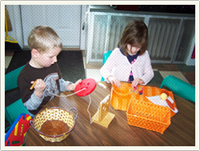Why Montessori
 Children of mixed ages interact sociably and independently using materials designed by Dr. Montessori. By having the ability to choose their own activities, children develop practical and intellectual skills through individual discovery and exploration of sensory language, mathematics, geography, science, art, music, and cultural areas of study.
Children of mixed ages interact sociably and independently using materials designed by Dr. Montessori. By having the ability to choose their own activities, children develop practical and intellectual skills through individual discovery and exploration of sensory language, mathematics, geography, science, art, music, and cultural areas of study.
Social interaction is critical to a young child’s development, and the Montessori Method offers a unique, highly social environment, combining freedom and structure, founded on respect. A Montessori education aids in the fullest development of the child, and provides each child with the foundation for a life of joyful learning.
- A Child-Centered Environment
In the Montessori setting, the focus of activity is always on the student’s learning and geared toward individual potential. - A Responsive Prepared Environment
Our unique environment is designed to match the needs, interests, and abilities of our students. - A Focus on Individualized Progress and Development
Each child “perfects himself through his own powers, and goes forward guided by the inner force which distinguishes him as an individual.” (The Montessori Method by Maria Montessori) - An Intrinsic Motivation to Learn
Characteristic qualities of the lesson are its “brevity”, “simplicity”, and “objectivity” so as “not to offend the principles of liberty” that invoke the natural effort of the child. (The Montessori Method by Maria Montessori )

The Montessori Method of self-education is a tried and true teaching system used in both private and public early childhood educational programs around the world. The goal is to nurture each child's own innate curiosity and desire to learn.
With Montessori, children learn by employing all 5 senses: touch, sight, smell, taste, & hearing.

Independence is encouraged in all activities, particularly in developing self-help skills while the teacher acts as a facilitator to ensure the needs of the child are met in an uninhibited, safe environment.
This innovative learning system places emphasis on the individual stages of a young child's development. As an individualized program, children are not pushed to do more than is developmentally appropriate.

